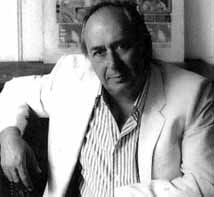J. G. Ballard
| J. G. Ballard | |
|---|---|

Ballard in 1993
|
|
| Born | James Graham Ballard 15 November 1930 Shanghai International Settlement, China |
| Died | 19 April 2009 (aged 78) London, England |
| Occupation | Novelist, short story writer |
| Alma mater |
University of Cambridge Queen Mary, University of London |
| Genre |
Science fiction transgressive fiction |
| Literary movement | New Wave |
| Notable works |
Crash Empire of the Sun High-Rise |
James Graham "J. G." Ballard (15 November 1930 – 19 April 2009) was an English novelist, short story writer, and essayist. He came to be associated with the New Wave of science fiction early in his career with apocalyptic (or post-apocalyptic) novels such as The Wind from Nowhere (1961) and The Drowned World (1962). In the late 1960s, Ballard produced a variety of experimental short stories (or "condensed novels"), such as those collected in the controversial The Atrocity Exhibition (1970), which drew comparisons with the work of postmodernist writers such as William S. Burroughs. In the mid 1970s, he published several novels, among them the highly controversial Crash (1973), a story about symphorophilia and car crash fetishism, and High-Rise (1975), a depiction of a luxury apartment building's descent into violent chaos.
While much of Ballard's fiction is thematically and stylistically provocative, he is perhaps best known for his relatively conventional war novel, Empire of the Sun (1984), a semi-autobiographical account of a young British boy's experiences in Shanghai during Japanese occupation. Described by The Guardian as "the best British novel about the Second World War", the story was adapted into a 1987 film by Steven Spielberg starring Christian Bale. In the following decades until his death in 2009, Ballard's work shifted toward the form of the traditional crime novel. Several of his earlier works have been adapted into films, including David Cronenberg's controversial 1996 adaptation of Crash and Ben Wheatley's 2015 adaptation of High-Rise.
...
Wikipedia
